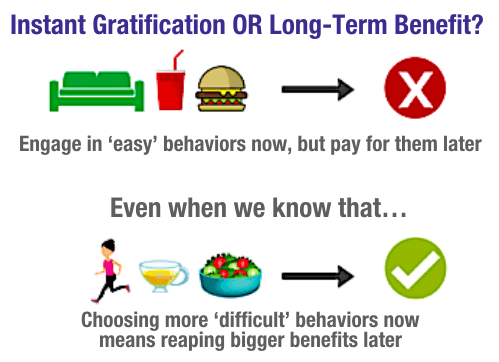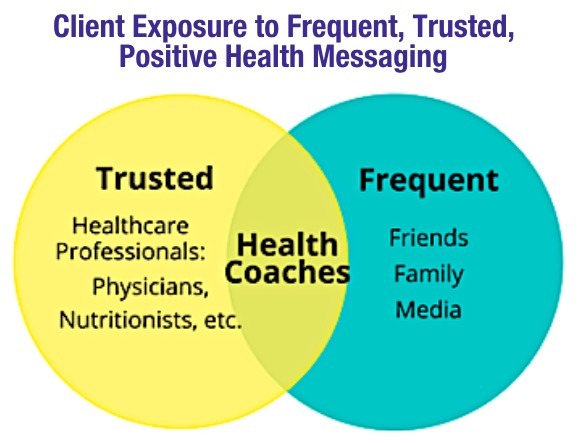At the Mindd Foundation, we advocate the value of consulting with integrative health practitioners for all health conditions. As part of a team of health professionals, Health Coaches can guide and assist to support optimal health outcomes.
 Health Coaches are no stranger to this idea; it’s part of why long-term lifestyle change is so difficult. A Health Coach who is trained to recognize biases is able to help their clients become aware of their biases and to find counter-biasing strategies to overcome them.
Health Coaches are no stranger to this idea; it’s part of why long-term lifestyle change is so difficult. A Health Coach who is trained to recognize biases is able to help their clients become aware of their biases and to find counter-biasing strategies to overcome them.
As healthcare professionals who are both trusted and accessible, Health Coaches can provide the regular reinforcement of longer-term, quality of life choices.
Health Coaches can be the bias-fighting resource with whom clients can communicate, who can assess their needs as a plan is co-created, while providing encouragement and motivation as the client self-manages its implementation.
Health Coaches are unique in that they are both trusted and seen with frequency. It is this feature can help clients stick to the plan and gain better health as a result.
Wall Street Journal Reports on the Value of Health Coaches
Functional Medicine Coaching Academy
Understanding the Role of a Health Coach
A Health Coach can:- Inspire and support real, long-term changes in their clients’ behavior
- Help recalibrate long-held thought patterns that no longer serve clients needs
- Earn client trust and engagement
- Interact with clients at a frequency that can support sustained results
1. Health Coaches Help Overcome Unconscious Biases
Some clients hold unconscious biases which have long been disproved. These biases can be recognised and addressed with the help of a health coach as they support and promote alternative ways of thinking.Fully understanding the power of bias can be a revelation
Take smoking for example; when provided with evidence, of the likely poor outcome of smoking, it is logical to think that people would make the rational, informed decision to not smoke. However, having information is one thing, acting upon it is something completely different. As Health Coaches are well aware, when it comes to health impacting behaviors, people often prioritize immediate gratification, even when they know that these choices will cause harm.Why Do People Choose Instant Gratification Over Long-Term Benefit?
Why do we do this? Chalk it up to unconscious bias, specifically, a phenomenon called hyperbolic discounting; which is choosing an immediate benefit over a delayed benefit. Sticking with our smoking example, hyperbolic discounting is choosing the immediate perceived benefit of smoking a cigarette over the delayed benefit of lung health and reduced cancer risk. When we are faced with a choice, we typically focus on the immediate outcome instead of the longer-term effect. For example, not prioritizing lifestyle factors such as exercise, sleep and stress reduction because we are instead prioritizing instant gratification. Health Coaches are no stranger to this idea; it’s part of why long-term lifestyle change is so difficult. A Health Coach who is trained to recognize biases is able to help their clients become aware of their biases and to find counter-biasing strategies to overcome them.
Health Coaches are no stranger to this idea; it’s part of why long-term lifestyle change is so difficult. A Health Coach who is trained to recognize biases is able to help their clients become aware of their biases and to find counter-biasing strategies to overcome them.
2. Health Coaches Keep You On Track
The role of a Health Coach is to influence clients to prioritize those longer-term benefits and their longer-term payoffs. The success or otherwise of a client’s journey to change comes down to how often and from whom they receive the messages to make healthy choices. Their client’s “inner circle,” the sources whom they trust and from whom they receive regular health-related messages, often tempt them to instant gratification, to putting off healthy choices rather than prioritizing them. In the traditional model, physicians tend to see patients only a few times a year, leaving a disconnect: who is advocating for healthy choices on a regular basis? Health Coaches Provide Regular Reinforcement
Health Coaches Provide Regular Reinforcement
As healthcare professionals who are both trusted and accessible, Health Coaches can provide the regular reinforcement of longer-term, quality of life choices.
Health Coaches can be the bias-fighting resource with whom clients can communicate, who can assess their needs as a plan is co-created, while providing encouragement and motivation as the client self-manages its implementation.
Health Coaches are unique in that they are both trusted and seen with frequency. It is this feature can help clients stick to the plan and gain better health as a result.
3. Progress Tracking Tools with Health Coaches
To overcome the reality that coaches can’t be with their clients all the time, apps are constantly being developed.- Progress-tracking apps are a great way to start; they exist for just about everything, from sleep trackers and activity monitors to food journals and diabetes management. They can help clients zero in on their focus areas or issues, and they can be valuable sources of data for Coaches as well.
- ‘Healthie’ the practice management and telehealth platform (and new FMCA resource!) can also be used very effectively. Healthie’s telehealth capability, in particular, makes it easy for coaches to interact with patients on-demand, whenever they need to touch base for information or support. Simply finding a way to be there for your clients when they need you can help bring Health Coaches into the inner circle, and both earn and keep clients’ trust.
Recognizing Unconscious Biases is Key
The big takeaway for Coaches is that simply being aware of unconscious biases, and helping clients become aware of them, is the first step in helping them to reach their long-term health goals. The more a coach is aware of biases and how easily they distort views, the better they will perform as a coach. Without being aware of what these biases are, they will not be overcome. For the best advice on building that awareness here is some highly recommended reading for both clients and coaches:- The Undoing Project by Michael Lewis
- Thinking Fast and Slow by Daniel Kahneman, and
- Nudge by Richard Thaler and Cass Sunstein




